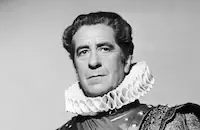Two Sinners
Cast & Crew
Arthur Lubin
Otto Kruger
Martha Sleeper
Minna Gombell
Ferdinand Munier
Cora Sue Collins
Film Details
Technical Specs

Synopsis
Henry Vane is released from prison after serving fifteen years for shooting the lover his wife took while he served in the army during World War I. Henry cannot adjust to modern London and the cold treatment he receives from his former friends, so he goes to France. While there he meets Sally, the bratty child of neglectful Claudine Pym, and Sally's governess, the shy but caring Elsie Summerstone. Henry is taken with Elsie, and to spend more time with her, he becomes friends with Sally, whose mother treats Elsie shabbily. One night, when Claudine goes to Monte Carlo with her rich, pompous boyfriend, Monte Alabaster, Sally leads Elsie on a chase through the hotel corridors and falls down the stairs. Henry helps Elsie take care of the child, who suffers a fractured arm, but when he finally succeeds in reaching Claudine, she says she will not return until the following morning. When Claudine returns, she yells at Elsie for allowing Sally to come to harm. Sally rises to Elsie's defense, and Claudine strikes her injured daughter. Claudine then fires Elsie, but when Elsie asks for the two months back wages owed to her so that she can return to England, Claudine cannot pay her and so rehires her. After Sally's recovery, Henry and Elsie watch her play, and Henry tells Elsie the story of his crime and punishment. Although she is usually compassionate, Elsie is horrified and runs off. Henry is disappointed, for he had hoped to marry Elsie, and he leaves the hotel. Elsie realizes her mistake and goes to apologize, but it is too late. After discovering that Henry is gone, Elsie also finds out that her mother is dangerously ill. Claudine gives Elsie a check for her wages, but the English consul cannot cash it. Elsie returns to the hotel and in desperation takes some money from Claudine's purse, which is not as empty as Claudine had claimed. Claudine sees Elsie take the money, and after they quarrel, Elsie throws Claudine to the ground. Claudine has Elsie arrested for robbery and attempted murder, and despite the obvious injustices committed against Elsie, she is convicted and sentenced to the Maison Masque, a prison where the inmates must where masks. During the trial, Sally locates Henry, and although he appeals to Humphrey Grylls, the British consul, nothing can be done. Henry visits Elsie, telling her that she is not alone, and that they have a bright future together. Outside the courthouse, Henry finds Sally, who has run away to visit Elsie. Not far behind her is Claudine, who arrogantly ignores the traffic and is run over and killed. Eventually, after many appeals, Grylls succeeds in obtaining Elsie's release. Henry gets Elsie from the prison and takes her to the beautiful home he and Sally, who is now his adopted daughter, have prepared for her.

Director
Arthur Lubin
Cast

Otto Kruger
Martha Sleeper

Minna Gombell
Ferdinand Munier
Cora Sue Collins
Margaret Seddon
Harrington Reynolds
Fred Walton
Olaf Hytten
Montague Shaw
William P. Carleton
Harold Entwistle
Madelyn Batson

Robert Warwick
Richard Lancaster
Hart Rooksby
Pat Somerset
Stuart Travant
Marcelle Printemps
Andre Cheron
Nellie Nicholas
Louise Fresano
Mario Romaris
Leon Lance
Harold Nelson
Crew
Ralph Bettinson
Irene Carr
Trem Carr
E. R. Hickson
Lettie Lee
Harry Neumann
Jack Ogilvie
Jefferson Parker
Mrs. Wallace Reid
Herman Schlom
J. A. Stransky Jr.
Robert E. Welsh

Film Details
Technical Specs

Quotes
Trivia
Notes
This film's working title was Two Black Sheep. George Warwick Deeping's novel was serialized in Hearst's International-Cosmopolitan under the title "Black Sheep, Black Sheep" (Sep 1932-February 1933). Hollywood Reporter production charts include the following actors in the cast: Stanley Orr, Boyd Irwin, Ernest Van Pelt, Roland Cleveland, Ed Reinach and Wilbur Stutz. Their participation in the completed film has not been confirmed, however. This was the first of many pictures directed by Arthur Lubin for Republic.












